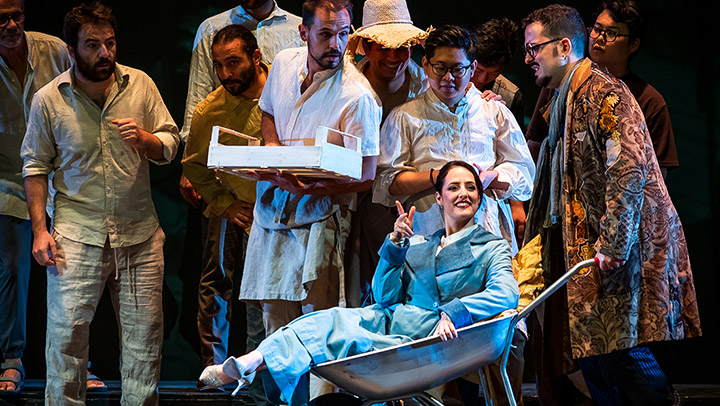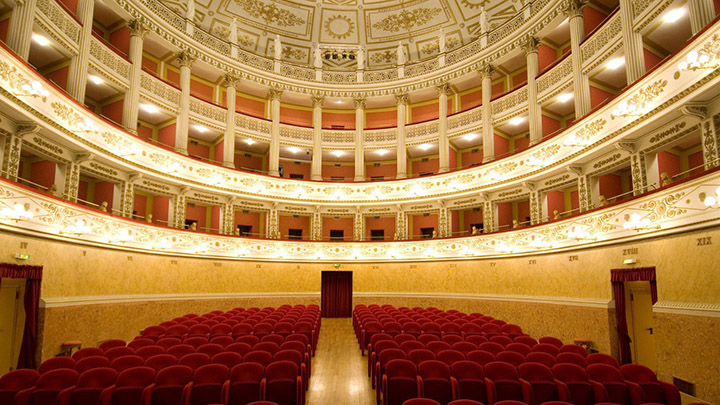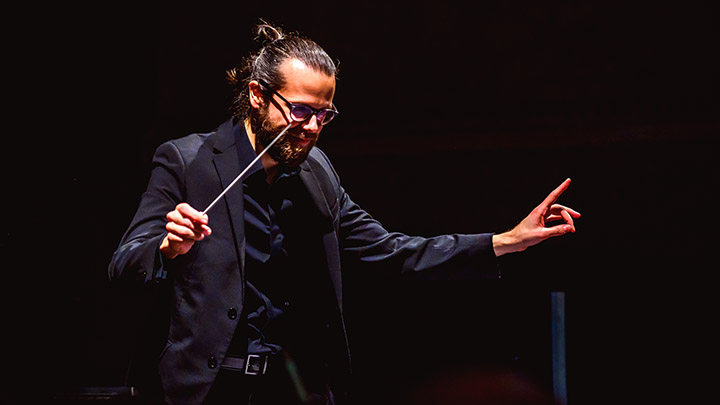In 1980, a major opera festival was established in Pesaro, the birthplace of Gioachino Rossini, that in just a few years became the most important summer music event in Italy: the Rossini Opera Festival. Since 2022, it has been flanked by a smaller festival entitled Il Belcanto ritrovato (The rediscovered Belcanto), which immediately became its natural complement, which begins as soon as the Rossini festival ends. Its aim is to bring attention back to forgotten composers active in Italy during Rossini’s life while also involving smaller towns close to Pesaro (Urbino, Fano, Fabriano, Recanati, etc.).
Each edition of Il Belcanto ritrovato festival is characterized by an opera staged for the first time in the modern era and a series of concerts featuring operas by other forgotten composers. In 2022, the opera chosen was Pietro Generali’s Cecchina suonatrice di ghironda (Cecchina, the hurdy-gurdy player), a farce from 1810 that is very similar to the early one-act farces written by Rossini for Venice (La cambiale di matrimonio, L’inganno felice, La scala di seta, L’occasione fa il ladro, Il Signor Bruschino).
Last year, the honor of restoration to the stage fell to Il birraio di Preston (The Brewer of Preston), a comic opera in three acts by Luigi Ricci written for Florence in 1847, about which curiosity had been aroused thanks to the success of a novel of the same name by Andrea Camilleri (1995) centred on the unrest that arose in 1874 around the performance of Ricci’s opera in the Sicilian city of Caltanissetta. Both performances were released on CD on the Bongiovanni label.
This year’s festival revived Lauro Rossi’s (1810-1885) two-act comic opera La casa disabitata (The deserted house), written in 1834 for Milan, but now presented in its second version created in 1844 for Turin. The venue of the performance (only one night, unfortunately, as is the thrifty tradition of this festival) was not Pesaro, as in previous years, but Fano, on August 24, 2024, in the splendid Teatro della Fortuna (architecturally very different from the common 19th-century Italian theatres). And the move from Pesaro (where the previous evening the Rossini Opera Festival had concluded with the commemoration of the first modern performance of Il viaggio a Reims by Claudio Abbado and Luca Ronconi, 40 years ago) to Fano (just 7 miles away) recalled the elder Rossini’s account in an unpublished letter in which he remembers the beauty of that road along the sea coast when he travelled it as a child.
Lauro Rossi was one of the many authors who kept the genre of Italian comic opera alive after Rossini, a genre that certainly did not die after Donizetti’s Don Pasquale and remained alive throughout the second half of the 19th century up to when Verdi composed Falstaff at the end of the century (Verdi’s opera is therefore not an isolated experiment, as we are mistakenly led to believe today); instead, Rossi was part of a long tradition of comic opera that had never died down and would continue until at least Puccini’s Gianni Schicchi.
Lauro Rossi’s music for this opera is actually in the style of L’Elisir d’amore, always pleasing to listen to and always well written, but never brilliant or memorable and in many cases unnecessarily long-winded and repetitive: after almost three hours of performance, we go home without a single melody in our heads, unlike with Rossini and Donizetti’s comic operas, even if we hear them for the first time. This is why the work being done by a festival such as Il Belcanto ritrovato is so important: only by knowing what went on around the great composers is it possible to truly understand why they are great and why their operas have come down to us (and why dozens of other titles have been left behind).
The libretto of La casa disabitata is by the same Jacopo Ferretti (1784-1852) who was also the poet of La Cenerentola and Matilde di Shabran for Rossini, and various operas for Donizetti, Mercadante, Pacini, and the above Ricci. But here we find none of the brilliance that he included in his two formidable libretti for Rossini: the story told is weak and the verses are scarcely comic. The modern spectator therefore finds little interest in the dramaturgy of this work and the director Cristina Pierantonio has nothing to do but stage what little the score and libretto require, without any bizarre ideas (fortunately), but equally without any brilliant ones. Yet the opera was greatly appreciated in its day, touring even outside Italy, with performances for almost half a century. Our relationship, albeit unsatisfactory, with titles such as La casa disabitata therefore helps us to understand today what the theatrical tastes of our ancestors were, who in many cases could not immediately appreciate more complex and refined works, but were pleased with simpler and plainer operas such as this one.
Starting from these admittedly limp premises, the musical performers did more than could be expected. The singers were chosen in collaboration with the Accademia Rossiniana ‘Alberto Zedda’ of the Rossini Opera Festival, all of a good, if not excellent, standard, particularly on the male side. Worthy of mention are at least tenor Antonio Mandrillo (who until four days before had sung the part of Pilade in Ermione at the Rossini Opera Festival), baritone Giuseppe Toia (who specializes in Rossini’s comic roles), and, above all, baritone Matteo Mancini (who augurs a notable career also in the serious repertoire). On the female side, the main performers were Vittoriana De Amicis, in the role of the comic soprano, and Tamar Ugrekhelidze as a serious mezzo-soprano. Rather than a comic opera, La casa disabitata actually takes the form of an opera semiseria, having at its center the abduction of a young girl who is kept sequestered in the basement of an uninhabited house where counterfeit coins are clandestinely minted.
If the musical machine worked so well, the credit was primarily due to conductor Enrico Lombardi, who made the ‘G. Rossini’ Symphony Orchestra of Pesaro play at its best and unceasingly kept full control of those young singers, goading them along phrase after phrase.
It is worth mentioning here that Lombardi suddenly rose to musical fame last summer, precisely in Pesaro: after the first performance of the opera Adelaide di Borgogna at the Rossini Opera Festival, the principal conductor had an accident that prevented him from conducting the subsequent performances. The young Enrico Lombardi, who had by chance attended the performance, made himself available to study the score (which is anything but a repertoire piece!) in just two days, thus managing to conduct the subsequent performances without a single rehearsal with the orchestra and singers.
The musical outcome was exciting, free of insecurities and flaws, which led to expectations and hopes of an immediate return of Lombardi to the Rossini festival. Instead, it was Il Belcanto ritorvato that secured his contribution for the revival of La casa disabitata, a much more difficult score to manage, due to the aforesaid musical and dramaturgical weaknesses (and the commendable decision to perform it in its entirety should not be overlooked).
Watching Lombardi conduct was a more captivating spectacle than the stage. If the right hand is very precise in beating musical time, the left hand continually sends valuable live directions to singers and instrumentalists for defining the nature of the various attacks (dispensed by him in greater numbers than one usually sees other conductors do) and always supplied by the expressive suggestion with which each new musical phrase was to be uttered. Nothing mechanical, but always soft and flexible and capable of obtaining a varied and rich palette of musical colors from the orchestra and a precision of execution that is often lacking among young performers from the singers. An artist, in short, to be followed with great attention in the years to come.
Photos: Pierluigi Angelucci






